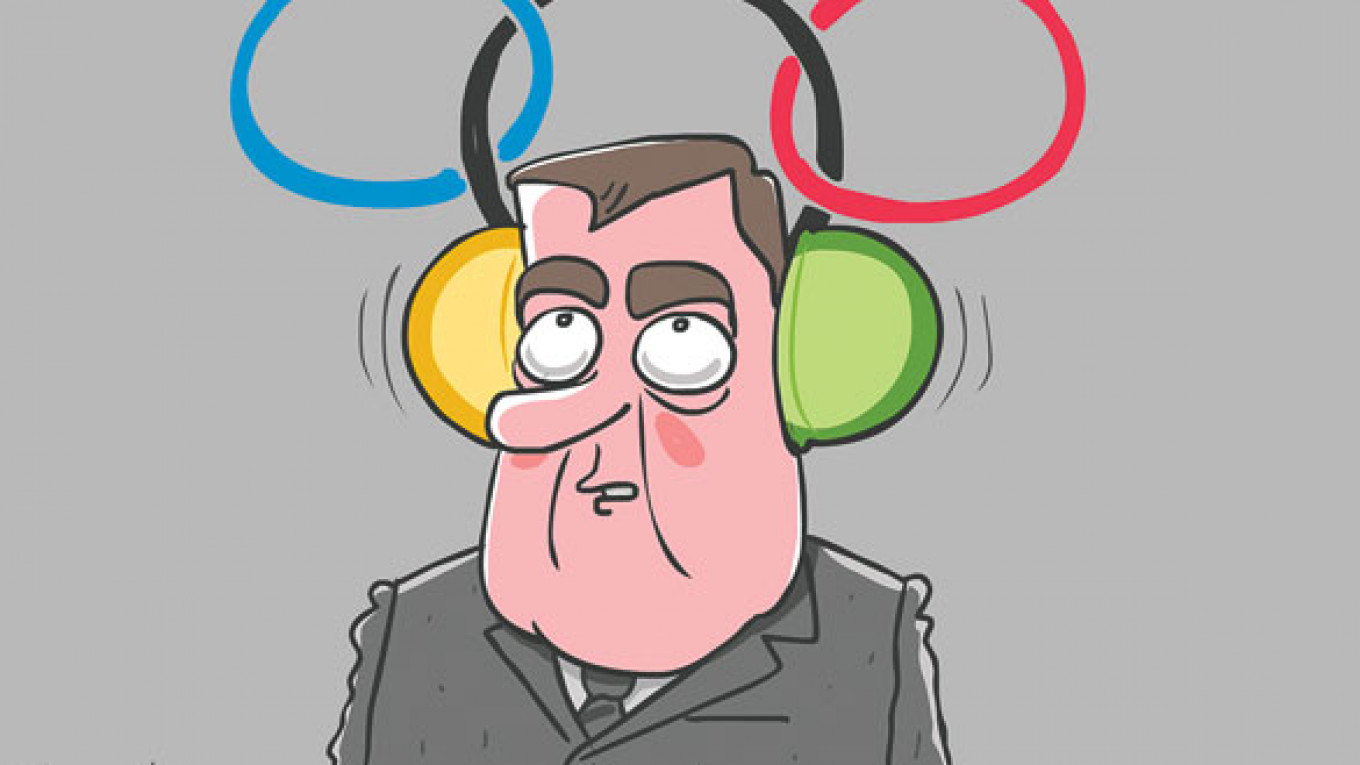As the date for the Olympic Games in Sochi draws closer, Russia's siloviki are becoming more active in terms of collecting data from Russians and foreigners. Although they can at least partially justify their decision to register every Russian who comes to Sochi during the Olympics with the desire to prevent terrorist attacks, the decree that Prime Minister Dmitry Medvedev signed Nov. 8 has no relationship whatsoever to that goal.
That decree expressly authorizes the government to collect data on telephone calls and Internet contacts made by the Olympic Games' organizers, athletes and foreign journalists.
Russian intelligence agencies are violating the law when they gather metadata on citizens without a court order.
Irina Borogan and I have already published an article in The Guardian in October explaining how the authorities had installed an advanced wiretapping and surveillance system in Sochi, but Medvedev's order adds significant scope to those activities.
The decree provides for the creation of a database for the users of all types of communication, including Internet services at public Wi-Fi locations "in a volume equal to the volume of information contained in the Olympic and Paralympic identity and accreditation cards." That is, the database will contain not only each subscriber's full name, but also detailed information guaranteed to establish his identity. What's more, the database will contain "data on payments for communications services rendered, including connections, traffic and subscriber payments."
That is called "gathering metadata" in the language of intelligence agencies.
The disclosure made last summer by U.S. National Security Agency leaker Edward Snowden on Washington's metadata collection activities sparked outrage over the unlawful government intrusion into the private lives of citizens. It turned out that, every 90 days, a judge from the Foreign Intelligence Surveillance Court issued a warrant authorizing the collection of vast amounts of data on U.S. citizens' e-mail communications.
Although the NSA did not intercept the content of electronic communications, the public outcry in the U.S. was still huge. Authorities were still able to intercept data about a person's contacts, the frequency of their communications and where that person is located at any given moment.
The Snowden leaks caused an uproar not only in the U.S. The collection of metadata provoked sharp criticisms from pro-Kremlin agencies specializing in the study of human rights violations in the U.S. For example, the Institute for Democracy and Cooperation headed by Anatoly Kucherena, who also serves as the lawyer to Edward Snowden, directly stated in a report titled "Human Rights in the United States in 2013" that the collection of metadata on U.S. citizens violates the U.S. Constitution.
But what Kuchurena failed to mention is that when Russia's intelligence agencies collect metadata without a court order, it violates Russian laws. In September 2012, the country's Supreme Court issued an interpretation stating that both a subscriber's phone number and the connections between subscribers are confidential elements of phone conversations. The court ruled that "obtaining such information is an invasion of privacy and abridges citizens' constitutional right to confidential telephone conversations" and that "agencies performing operational and search activities must obtain a court order to gain access to such information."
Which individuals will be included in the database authorized by Medvedev's decree? According to the text of that document, Russian authorities will be monitoring the organizers and participants of the Games, including members of the International Olympics and Paralympics Committees, the World Anti-Doping Agency, the Court of Arbitration for Sport, national Olympics committees, as well as athletes, team doctors and technical assistants and even referees and event judges.
But that's not all. A separate clause lists foreign news agencies and media services, and one paragraph lower, accredited journalists and photographers are mentioned a second time just in case.
What's more, the information collected during the Olympic Games will be stored for three years and the Federal Security Service will have "round-the-clock remote access to the subscriber database." That means the FSB, operating from a remote location, will have three years to explore to whom, when and how often athletes, judges and journalists attending the Games made calls. ?
There are two curious things about this. First, this was not a secret decree. It was made fully public. Second, the decree instructs Russia's Olympic Organizing Committee, not the FSB or even phone operators, to maintain the database. That means Russian authorities consider the surveillance of Olympic guests such a natural thing that they did not hesitate to give the responsibility to their Olympic Organizing Committee. Apparently committee members have no problem with the decision either.
Now the question is: Will Kucherena of the Institute for Democracy and Cooperation issue an opinion regarding Russia's collection of metadata, and if he opposes it, will anybody listen?
Andrei Soldatov is an intelligence analyst at? Agentura.ru? and co-author of "The New Nobility: The Restoration of Russia's Security State and the Enduring Legacy of the KGB."
A Message from The Moscow Times:
Dear readers,
We are facing unprecedented challenges. Russia's Prosecutor General's Office has designated The Moscow Times as an "undesirable" organization, criminalizing our work and putting our staff at risk of prosecution. This follows our earlier unjust labeling as a "foreign agent."
These actions are direct attempts to silence independent journalism in Russia. The authorities claim our work "discredits the decisions of the Russian leadership." We see things differently: we strive to provide accurate, unbiased reporting on Russia.
We, the journalists of The Moscow Times, refuse to be silenced. But to continue our work, we need your help.
Your support, no matter how small, makes a world of difference. If you can, please support us monthly starting from just $2. It's quick to set up, and every contribution makes a significant impact.
By supporting The Moscow Times, you're defending open, independent journalism in the face of repression. Thank you for standing with us.
Remind me later.


